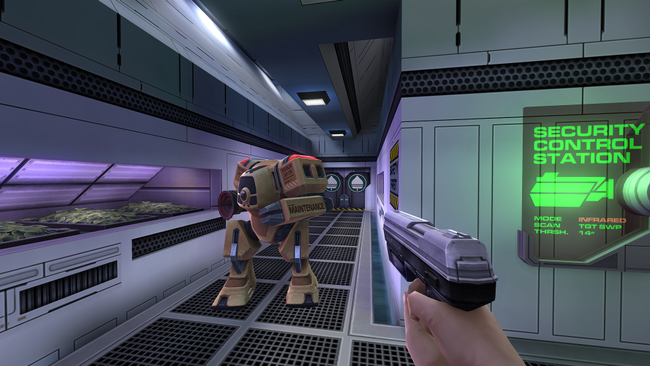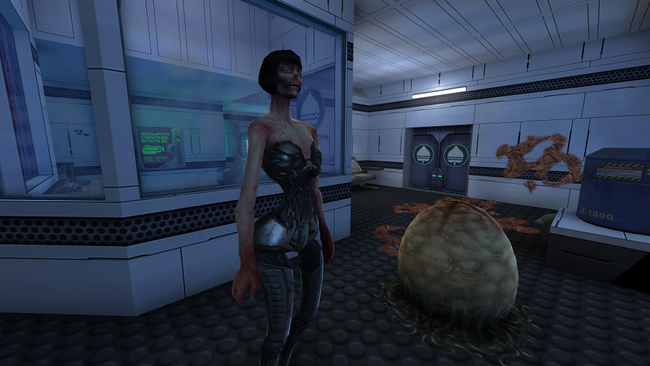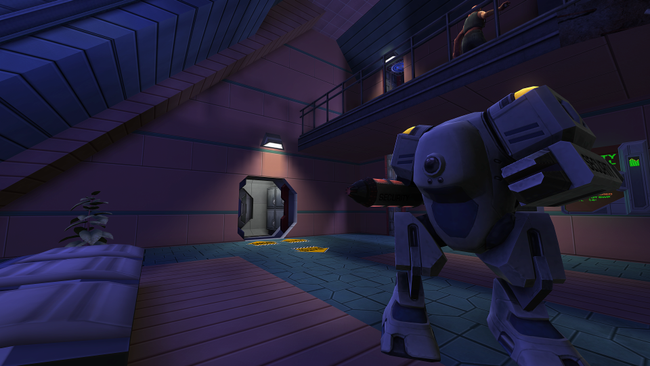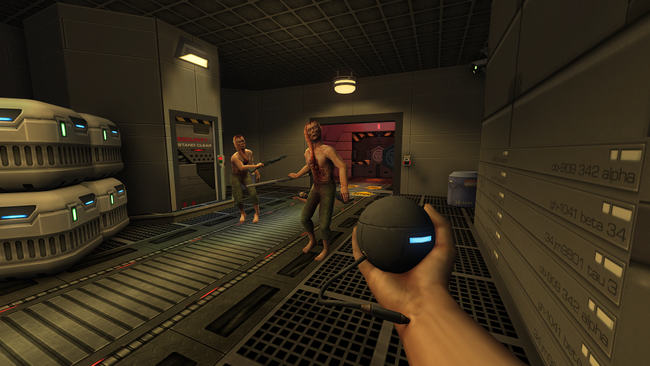
System Shock 2: 25th Anniversary Remaster Review
Sometimes, it feels strange that I somehow ended up as the editor-in-chief of RPG Site. I grew up in the 90s, primarily raised on late-era DOS games and into the era of the PC CD-ROM. Jazz Jackrabbit is the first game I remember playing myself when I was about 5 years old. My videogame childhood largely consisted of other PC now-classics around the time; stuff like Wolfenstein 3D, DOOM, Heretic, Hexen, King's Quest (and other Sierra titles), Tyrian, Age of Empires, Commander Keen, several Maxis games, and so on. I was raised largely on sidescrollers, shooters, adventure games, and simulation games. It wasn't until I got a PlayStation 2 that I discovered what we all generally refer to as role-playing games, which I of course fell in love with.
But that's besides the point. System Shock and especially its sequel System Shock 2 are games that could have easily been a part of my adolescence, given their platform and reverence, but they somehow slipped through the cracks. Granted, they weren't as popular at the time as several of the games I mentioned, and honestly, probably too complex for pre-teen me to handle. Even so, System Shock 2 has always felt like a part of the canon of classic PC titles that I simply had missed out on, before now.
I have heard about System Shock 2's greatness and influence for years, and how it led to games like Bioshock and Prey alongside inspiring a litany of other immersive sim or horror-adjacent titles. A remaster has essentially been in the works for years, and it feels like this moment has been a long time coming. System Shock 2: 25th Anniversary Remaster is finally seeing release. To me, this was a perfect opportunity to remove a blind spot.

Booting up System Shock 2 for the first time feels familiar, even though I've never played it before. The low-poly models, basic textures, UI quirks, color scheme, control scheme, and even sound effects all feel exactly as I expect a game from the late 90s would, and I mean this in the best possible way. This is a remaster, of course, but as is the case with most of Nightdive's output, it's not trying to soup up the original version with a new look, overdone textures, lighting, or waypoints. It's not trying to look like a modern game, and it's not a full remake like System Shock (2023). Nightdive wants to be faithful, and as was stated in my GDC interview, they often frame this as an act of preservation more than anything else.
"We want our projects to recapture what was important about the game in those days. In terms of things that we do look to change - we want modern players coming to the game for the first time to be able to play our games intuitively and to understand how they work," is what Nightdive's bizdev VP Larry Kuperman said at the time.
System Shock 2 (mostly) takes place on a new faster-than-light ship known as the Von Braun, about 40 years after the events of the original game. A distress signal from a nearby planet sees a rescue team from the ship encounter a strange set of alien eggs, which ultimately leads the unnamed protagonist to wake from cryostasis on the ship, now only home to zombie-fied infected crewmembers and other parasitic monstrosities.

System Shock 2 exhibits a combination of various genres, including first-person shooter, survival horror, and RPG. As far as the "role-playing" components go, this manifests in the sort of skills that the player can develop over the course of the game. You have your stats like Strength, Endurance, & Agility, which broadly affect the things you'd expect them to. You have technical skills like hacking, repairing, and modifying. You have weapon proficiencies in standard, energy, heavy, and exotic weapons. And finally, you have a few dozen different Psy abilities to choose from, ranging from damaging energy blasts to stealth capability to item duplication.
I played through System Shock 2's remaster twice, once as a weapon-focused shooter and the second time leaning more into the more tech-magical Psy abilities instead. While you don't gain "EXP" or anything in that manner in the traditional sense, you do find 'cybermodules' throughout the game that can be spent on all of these upgrades to the player's choosing. True to role-playing principles, you can pick and choose which abilities or stats are most interesting to you, or support your character 'build', even if it's not incredibly in-depth or well-balanced.
Some components of the remaster might feel 'done-before' by today's standards — things like a narrative told primarily through audio-logs, non-linear labyrinthine level design, resource management for ammo/health/buffs, general mood, and light puzzles or exploration to flag the path to the next level. I'm not saying System Shock was the first game to be designed in this manner, or exhibit these characteristics, but it's clear some of these sorts of components have become more commonplace in the years since. Going back to the game now is an interesting history lesson, as remasters sometimes tend to be.
Everything about System Shock's atmosphere is exceptional - a mix of foreboding sound design and urgent techno-laden high-percussion soundtrack, mixed in with ominous audio logs and the sinister SHODAN barking at you, as she is wont to do. There aren't a lot of enemies for you to mow down, but they are present enough and dangerous enough to keep you on your toes and your pistol loaded.
For what it is worth, I'm not a big horror game person myself; in fact I rarely play those sorts of games at all. To me, System Shock 2 is eerie but not scary, and I don't think you have to have an affinity for horror to play and enjoy System Shock 2, even if horror elements are undeniably a part of its construction. Honestly, the fact that the dated enemy models and gore don't look realistic probably helps here. I will note later in the game that there are spider enemies, for those who may need to know that ahead of time.

There are a few components of System Shock 2 that are a bit frustrating, even considering its late '90s origins. A weapon-degradation system is in place, meaning that you'll have to either find resources to repair your arsenal or often pick up new weapons when able. The ending sections of System Shock 2 are also a weak point, feeling somewhat like a streamlined funnel to the end at odds with the rest of game's structure. System Shock 2 isn't really a game that does 'boss battles' in general, so it's probably no surprise that the final boss itself falls flat, feeling more like an obligatory inclusion to gate the credits of the game.
I'm generally not a person who believes in 'games aging', but it is probably worth noting that this game is not as streamlined as something like Bioshock, for those coming at this remaster from that direction. Playing System Shock 2 is quite a bit slower & more deliberate, while requiring more player consideration in choosing how to spend your modules or manage your resources. I would not be surprised if some players find System Shock 2 to be dated, both mechanically and visually. I can't really argue against such a stance, since it is a fact that the game predates Bioshock by years, exhibits different design philosophies, and still looks like a game from the 90s. I can disagree that these are flaws of the game, since it was, personally, exactly what I was hoping for in that regard.
As far as new additions go, there's no new 'content' or anything like that added to the remaster. Gamepad controls have been added to support the game's impending console release. However, like the PC child that I was, this game would always be best on kb/m to me, and I can't speak much to how well the game works with a controller.
One of the most interesting components of the remaster is its inclusion of co-operative multiplayer. While this technically also existed in the original release of System Shock 2, it simply and famously did not work well. Nightdive has recently posted about the effort required for reverse-engineering the game code to properly implement it into the remaster.

In playing the remaster ahead of launch, I only had a brief chance to test the multiplayer functionality. I teamed up with RPG Site writer Mikhail (who tested the game on Steam Deck), mostly just to see how feasible starting a co-op run is. Even though I am based in the United States and Mikhail is based in India, we had no problem establishing a connection and starting a file. Other tidbits worth mentioning are that there seems to be only a single difficulty mode available in multiplayer, only the host will manage a single savefile for the playthrough, and cross-platform play is said to be supported. It also seems that the number of players in a playthrough (2, 3, or 4) must be determined at the start, although we were not able to test this thoroughly.
I can't say how well balanced multiplayer is compared to single-player, in terms of enemy density and item economy and what-have-you, but it works, and I'm already thinking about gifting this remaster to friends to actually try out a full co-op playthrough in the future. I suggest playing the game in single-player first, however, to get the most out of the game's story and general vibes. Nightdive themselves suggest this as well.
Playing System Shock 2's remaster felt like filling a gap in my past. Given my 90s PC upbringing, it was probably inevitable that I'd love playing it. I can never know what it was like to play the original System Shock 2 at the turn of the century, but a remaster like this feels like it does exactly what it should. It preserves a beloved classic while opening it to a new audience and improving its technical playability. I now actively find myself among those hoping that maybe a System Shock 3 will happen, eventually.